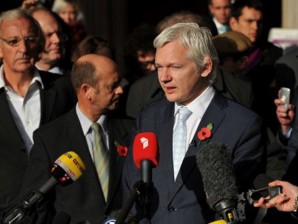The whistleblower: Assange’s life overshadows his work

CHECKERED LIFE WikiLeaks founder Julian Assange (center) speaks to the waiting media upon leaving London's High Court on November 2, 2011 after losing his legal battle to avoid extradition from Britain to Sweden to face questioning over allegations of rape and sexual assault. Two judges at the High Court rejected arguments by the 40-year-old Australian, whose anti-secrecy website has enraged governments around the world, that his extradition would be unlawful. AFP PHOTO / BEN STANSALL
LONDON—Julian Assange, who lost an appeal Wednesday against extradition from Britain to Sweden over sex crime allegations, is a divisive figure whose own story has come to overshadow the work of WikiLeaks.
The 40-year-old Australian, the founder of the anti-secrecy website, was virtually unknown until 2010 when the release of thousands of secret US documents by WikiLeaks that year thrust him into the limelight.
Eccentric and lanky with a shock of platinum white hair, he presented himself in early interviews as the morally upstanding frontman for a new type of journalism uncovering stories the mainstream media could not.
“We are creating a new standard for free press,” Assange told AFP during an interview in August last year.
He quickly became a divisive figure, winning a huge left-of-center following but enraging governments – particularly the United States, which mulled legal action against him and where there were calls for him to be killed.
Article continues after this advertisementBut it was not until August last year that he took center stage himself, when Swedish authorities issued a warrant for his arrest over claims of sexual assault and rape stemming from encounters with two women.
Article continues after this advertisementHe was then arrested in December in London and has been fighting extradition ever since.
For a whistleblower – and, critics would say, self-publicist – he has often seemed obsessed with keeping details of his own life under wraps.
In September he denounced the publication of his autobiography, which he had tried to block despite having sat for more than 50 hours of interviews with a ghost writer.
Born in Townsville, northeastern Australia, Assange says he spent his early childhood living on and off on the nearby Magnetic Island with his mother.
Assange has described his childhood as nomadic, saying in all he attended 37 different schools. In one memorable incident he describes getting into trouble after hitting a girl over the head with a hammer at primary school – adding that she was unharmed.
Living in Melbourne in the 1990s, the teenage Assange discovered a new talent: computer hacking.
But his new interest did not go undetected and he was charged with 30 counts of computer crime, including allegedly hacking police and US military computers.
He admitted most of the charges and walked away with a fine.
When he was 18 his son Daniel was born. The identity of his mother is not known but Assange has reportedly blamed the ensuing custody battle for turning his hair white.
After his brush with the law, Assange says he worked in a number of different fields, as a security consultant, a researcher in journalism and started his own IT company.
He says he founded WikiLeaks in 2006 with around 10 others from the human rights, media and technology fields.
The site went online in 2007 and began leaking secret documents well before its master stroke of releasing some 77,000 secret US files on Afghanistan in July last year.
That first mega-leak was followed in October 2010 by the release of some 400,000 so-called “Iraq war logs” and on November 28, it began the slow release of around 250,000 diplomatic cables from 274 US embassies.
That, too, ran into trouble as Assange fell out spectacularly with a string of “partner” media organizations in the release, including the New York Times in the United States and The Guardian in Britain.
At the head of WikiLeaks, Assange until his arrest seemed to lead a life out of a spy novel: constantly on the move, bouncing from capital to capital and staying with supporters and friends of friends, frequently switching his phone number.
But his arrest under a European arrest warrant put a stop to that lifestyle and it looks unlikely to resume soon after the High Court in London’s decision Wednesday to reject his appeal against extradition.
With WikiLeaks also in financial difficulties after a funding blockade, Assange now finds himself in a very different position to that just over a year ago, when his site burst onto the scene to widespread praise from both the public and press.